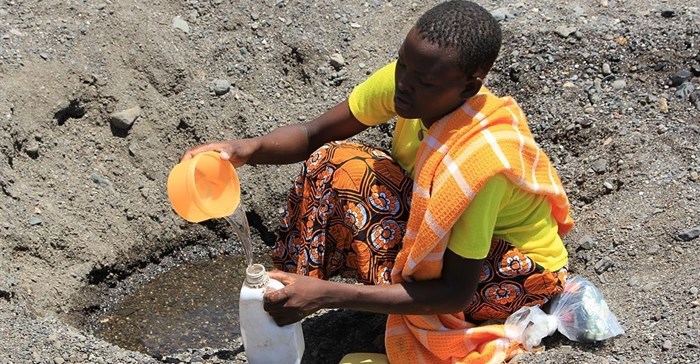
Subscribe & Follow
#AfricaMonth
In the news
Drought crisis deepens

Paula Barnard, director of World Vision, said many parts of KwaZulu-Natal were "a disaster zone" as people did not have food. The NGO was distributing famine relief to keep people alive and children in school. Its research showed that 500,000 people did not know where their next meal would come from as crops had failed.
Not enough water to go around
Busisiwe Mseleku of Nkolokotho near Mtubatuba, northern KwaZulu-Natal, said the dry Mfolozi River had devastated the community. "It is tough. Tap water comes just once in a day and not every day. We do not know when it will be available." "Kids have to get ready for school and there is no water for them to bathe in. We also have to cook in the evening and it is impossible."
Residents have to spend R40 to travel to and from Mtubatuba to buy 20 litres of water for R21. "Going to town is a nightmare. Taxi drivers do not allow us to carry more than two containers. They say their job is to carry passengers not goods," Mseleku said.
Increasing risk to health of population
Residents use ash to purify water. "We get sick sometimes because the water is not clean, but we do not have a choice," she said.
Barnard said children had sores and were frequently sick. The diminishing water in the rivers was being shared by humans and animals. She said young children who did not have clean water were at high risk of diarrhoea, which remains one of the biggest killers of children under five in the country.
World Vision said water tankers were not delivering water as frequently as a few months ago. Pools of stagnant water forming where rivers once flowed were a breeding ground for mosquitoes and the bilharzia parasite. The lack of water is also keeping children away from school.
Effecting school attendance
In Umvoti near Greytown, pupils have to take water to school for use in the kitchen or bathroom or they are sent home. "Those who don't bring water are sent back to fetch it", community members said. Barnard said girls who were menstruating skipped school because they did not have water to stay clean. The NGO was monitoring violence as vulnerable people could be at risk when people competed for water.
Lennox Mabaso, the KwaZuluNatal cooperative governance spokesman, said: "This drought is very intense and widespread. "Even areas that are affluent, where people have access to taps, now have to have tankers."
Food prices to remain high
As thousands starve in KwaZuluNatal, the rest of the country can expect food prices to remain high thanks to the widespread drought. White maize prices are about 60% higher than last year because of the weaker rand and too little rain in February, which resulted in a smaller crop. This means the price of pap, a staple for many, has increased.
Yellow maize, used for animal feed, is about 44% pricier than in October last year. Consumers will pay more for meat, eggs and dairy products.
Planting of crops delayed
Grain SA CEO Jannie de Villiers said meteorologists have predicted a hot dry summer because of El Niño, which is associated with prolonged droughts. This has prompted farmers on the eastern side of the country to delay planting yellow maize and soya, which is usually done in the middle of October.
If it does not rain in the next two weeks, it will be too late for Mpumalanga farmers to plant. Farmers in the Free State and North West have until mid-December to plant white maize.
Macquarie Securities economist Elna Moolman predicted food inflation would climb 10% by the middle of next year.
David Orr, spokesman for the UN World Food Programme said: "There are currently 1.5 million people in Zimbabwe who don't know where their next meal is coming from and three million food-insecure people in Malawi."
Source: The Times
Source: I-Net Bridge

For more than two decades, I-Net Bridge has been one of South Africa’s preferred electronic providers of innovative solutions, data of the highest calibre, reliable platforms and excellent supporting systems. Our products include workstations, web applications and data feeds packaged with in-depth news and powerful analytical tools empowering clients to make meaningful decisions.
We pride ourselves on our wide variety of in-house skills, encompassing multiple platforms and applications. These skills enable us to not only function as a first class facility, but also design, implement and support all our client needs at a level that confirms I-Net Bridge a leader in its field.
Go to: http://www.inet.co.zaRelated
Food inflation remains at record low despite slight uptick to 1.7% in December 2024 23 Jan 2025 Food inflation ends 8-month decline, rising 4.1% year-on-year in August 19 Sep 2024 #WomensMonth: Anina Hunter on empowering women in agriculture and animal feed 20 Aug 2024 Maltento opens new insect biotech lab in Cape Town 23 Apr 2024 Food inflation decelerates to a 25-month low 22 Mar 2024










